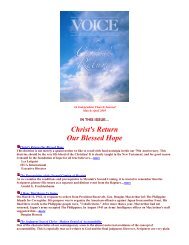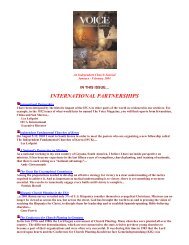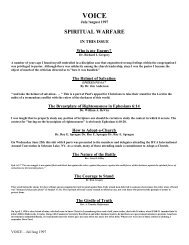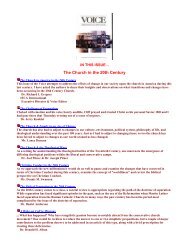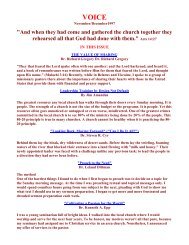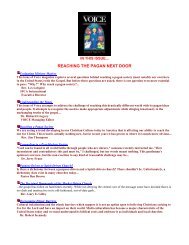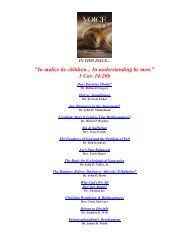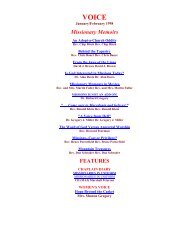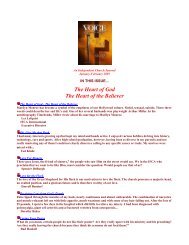IFCA REGIONAL LEADERS' HANDBOOK - IFCA International
IFCA REGIONAL LEADERS' HANDBOOK - IFCA International
IFCA REGIONAL LEADERS' HANDBOOK - IFCA International
Create successful ePaper yourself
Turn your PDF publications into a flip-book with our unique Google optimized e-Paper software.
financially supported their own pastor (1 Timothy 5:17-18)<br />
took care of their own local people in financial need (like widows, 1 Timothy<br />
5:3-16)<br />
Following this pattern, each of today's independent local churches depends upon<br />
the Holy Spirit's direction (Acts 13:1-3) and chooses its own name, government<br />
and programs. It is free to call its own pastor and invite into its pulpit any<br />
speakers it considers true to the Word of God. It is also free to seek God's<br />
direction in supporting those evangelistic ministries they find Scripturally<br />
acceptable and choosing the Christian education materials they believe are best<br />
to teach Bible truths to their people. They are also free to support whatever<br />
schools and institutions they believe are valuable for training their own young<br />
people and preparing their men for the Gospel ministry; mandatory obligation to<br />
protect a tradition or an investment is not involved in an independent local<br />
church's decision to support an educational institution.<br />
But the concept of the independent local church can be greatly misrepresented in<br />
the sinful actions of the church people. If the church leaders and congregation are<br />
not obedient to the Bible and refuse to be humbly directed by the Holy Spirit,<br />
they can degenerate into warring factions in the church (1 Corinthians 1:10-13;<br />
3:1-9) and domineering leaders lustful for control and power (1 Peter 5:3; 3 John<br />
9). Even though the New Testament teaches the autonomy of the local<br />
independent church under the Lordship of Jesus Christ, autonomy is meant that<br />
each church grows in its dependence upon the Lord. He is the Head of each<br />
church and He demands their godly submission in all areas of church life. They<br />
are to look to Him for the provision of their every need as a church. This type of<br />
church government encourages prayer, faith, and spiritual growth among all of<br />
its members.<br />
Also, the concept of the independent local church can be greatly misunderstood<br />
to justify isolationism and a spirit of exclusivity. Remember that the body of<br />
Christ transcends all earthly denominations and organizations (Ephesians 1:22-<br />
23). It is composed of all who have trusted Christ as Savior, regardless of<br />
organizational affiliation. Biblically independent churches strive to be loyal to<br />
Christ and His Word rather than to any organization. They seek to establish,<br />
preserve, and expand local churches according to the New Testament pattern.<br />
Yet the First Century apostles of Christ also encouraged cooperative<br />
interdependence between local churches:<br />
greetings were extended throughout all the New Testament between<br />
independent churches, indicating a relationship with other churches in other<br />
regions (example in Romans 16:23)<br />
Paul instructed the church at Rome to assist Phoebe in her visit from Corinth<br />
(Romans 16:1-2)<br />
21<br />
<strong>IFCA</strong> <strong>International</strong> Regional Leadership<br />
Handbook



